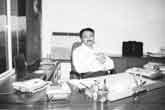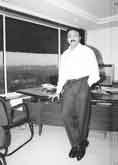
'I'm not a miracle man'
 For 39-year-old IAS officer, Dr. T. Chandra Shekhar, who has recently assumed charge as the joint metropolitan commissioner, being in saddle in a metropolis like Mumbai is no mean task. With a comprehensive plan for sprucing up and upgrading Mumbai up his sleeve, Dr. Chandra Shekhar hopes to make changes visible within a year's time. "The urban problems in most cities are quite the same. If I was successful in Nagpur and in Thane, Mumbai is no different from these," he tells HUBERT VAZ at his 6th floor chamber in the MMRDA premise at Bandra.
For 39-year-old IAS officer, Dr. T. Chandra Shekhar, who has recently assumed charge as the joint metropolitan commissioner, being in saddle in a metropolis like Mumbai is no mean task. With a comprehensive plan for sprucing up and upgrading Mumbai up his sleeve, Dr. Chandra Shekhar hopes to make changes visible within a year's time. "The urban problems in most cities are quite the same. If I was successful in Nagpur and in Thane, Mumbai is no different from these," he tells HUBERT VAZ at his 6th floor chamber in the MMRDA premise at Bandra.
You cannot trace a spot on his immaculate, cotton shirt nor a spec of dust on his neat desk overlooking a landscape rarely found in Mumbai... And, so it seems with his plans for the Mumbai metropolis wherein a sea change is in waiting 12 months down the road. Dr. T. Chandra Shekhar, it appears is a man who delivers!
Being installed in the city with relatively little fanfare, the press has, however, gone to town with Dr. Chandra Shekhar's credentials and his successes in cities like Nagpur and Thane where he was known to have churned out nothing short of miracles. And, while these cities have dressed up ever since he took their reins in hands, Mumbai now awaits a spate of wonder works.
"I'm not a miracle man, I'm a practical man," he admits coyly, but adds that a task at hand, however small, if executed with dedication, can do great things for the welfare of citizens. As he assumes charge as joint metropolitan commissioner and project director (Mumbai Urban Transport Project), Dr. Chandra Shekhar is fully aware that he has a "gigantic task" on hand. But, he will not be weighed down by the mundane pressures which are witnessed in every city.
A Maharashtra Cadre Officer of the Indian Administrative Service of 1987 batch, Dr. Chandra Shekhar has a doctorate in urban ecology from Mumbai University and has held various postings in the IAS including assistant collector of Amravati, Yavatmal, chief executive officer of Satara Zilla Parishad, administrator in Kalyan Municipal Corporation, district collector of Ratnagiri, Nagpur municipal commissioner and Thane municipal commissioner.
Dr. Chandra Shekhar has been credited of transforming Thane city, which was once notorious for underworld activity and unauthorised constructions, by being instrumental in its planned development and beautification. He had demolished more than 20,000 unauthorised constructions and encroachments despite pressure from politicians, conserved 15 lakes, streamlined the garbage disposal system and gained the 'Clean City Award' given by the Government of India in 2000. When he had been transferred from Thane, the whole of Thane had observed a self-imposed bandh for three days in protest.
His gusto and enthusiasm stems from his clean image, his determination to achieve targets and the string of accolades he has received. These include the Economic Times Leadership Award (2001) the Vocational Excellence Award (1995), Maharashtra Bhushan Award (1999) by Rotary International, All India Management Association Public Service Excellence Award (2002) and the good backing he currently receives from the Democratic Front government.
The second Clean City Award he got for transforming Nagpur city, the second capital of Maharashtra, in just two years. He also bagged the state government's Rajiv Gandhi Administrative Reforms Award for responsive administration in Nagpur Municipal Corporation.
Admitting that his task in Mumbai was mammoth, Dr. Chandra Shekhar said he enjoys taking up challenges. Any project, if implemented properly, can provide a lot of relief to the citizens, and the MUTP project in Mumbai is one which is poised to make life much easier for the citizens, he said.
 The Rs.4,500-crore project has World Bank sanction for a loan of Rs. 2,602 crore while the rest is to be raised by the MMRDA (Rs. 1,000 crore), BMC and BEST Undertaking. Of this amount, around Rs. 3,500 crore is to be used for the rail component while the remaining Rs. 1,000 crore is to be used for road development and other works.
The Rs.4,500-crore project has World Bank sanction for a loan of Rs. 2,602 crore while the rest is to be raised by the MMRDA (Rs. 1,000 crore), BMC and BEST Undertaking. Of this amount, around Rs. 3,500 crore is to be used for the rail component while the remaining Rs. 1,000 crore is to be used for road development and other works.
The Maharashtra Railway Vikas Corporation would execute the rail works which includes introduction of a 5th line between Mahim and Borivli and between Kurla and Thane besides a pair of new lines between Borivli and Virar. The BMC and BEST would take up the road works which includes link roads between Jogeshwari-Vikhroli, Santacruz-Chembur and two road over bridges at Jogeshwari and Vikhroli, besides introduction of 500 more buses, etc.
The spadework for all the projects have been completed, since they were pending World Bank sanction and now the project would be officially inaugurated in the last week of October, he disclosed. He, however, stressed on cooperation from people and NGOs since the works involve removal of 20,000 slums, which come in the way of works and rehabilitation of those displaced.
When asked about the beautification of Mumbai, Dr. Chandra Shekhar said he did not believe in cosmetic changes which are shortlived. "If a city has to acquire a new look, it must have better infrastructure which is aesthetically executed. It has been so in many other countries," he said.
When asked whether he had learnt any lessons from Nagpur and Thane which could be applicable to Mumbai, Dr. Chandra Shekhar said "the urban problems in most cities and their solutions are somewhat the same in most cities. However, in Mumbai its large size was the only problem. The influx has been so much that the population density is as high as 10,000 people per square kilometre," he pointed out.
"Mumbai faces three main problems: inadequate infrastructure, slums and unplanned development and poor sanitation," he spelled out adding that the MUTP project would take care of the first two while the third aspect would have to be a coordinated effort with the civic authorities. He, however, admitted that the problem of influx needs to be seriously tackled by the state government.
"Cooperation from the government and politicians besides support from civic and employees and participation from people are vital to the success of this project," he said, however, adding that "a strong political will" was the most important factor.
"It's not going to be a cakewalk," he admits but adds "Mumbai is a place where you can get results because it is financially better off than most other cities. Our focus will be on the suburbs where 80 per cent of the people reside."
With this challenging task at hand, this young IAS officer hopes to add yet another feather to his cap. Nevertheless the unforeseen political pressures and the hidden hurdles will in no way be a deterrent. His family (wife and two kids) is still in Nagpur and hope to join him in Mumbai soon. Till then, this avid reader and traveller hopes to keep himself busy chalking out his dream for Mumbai.